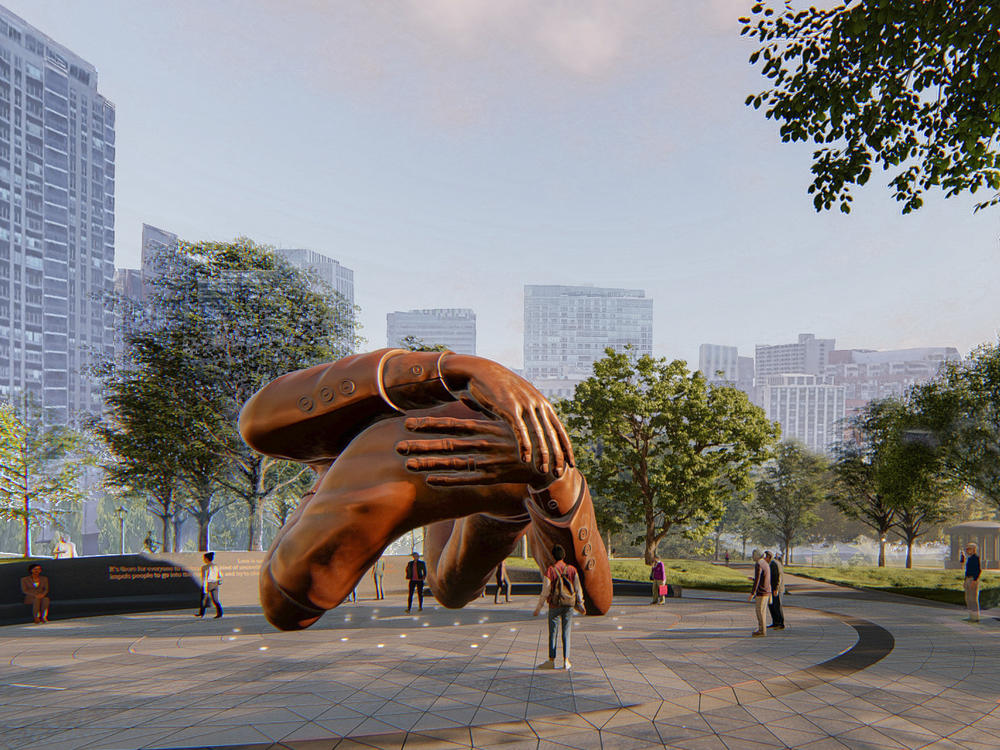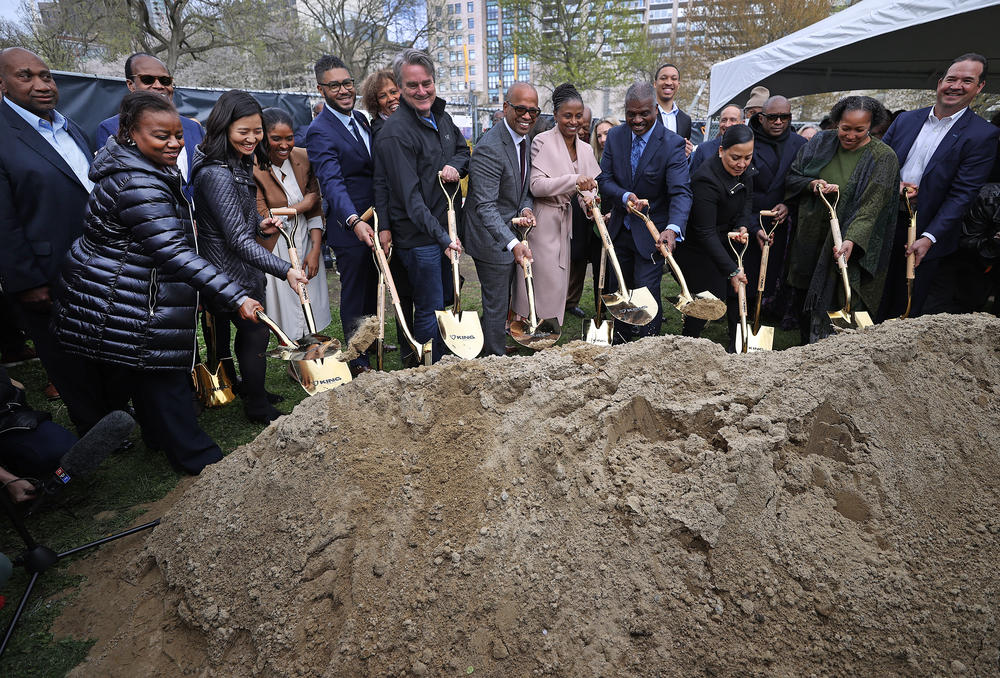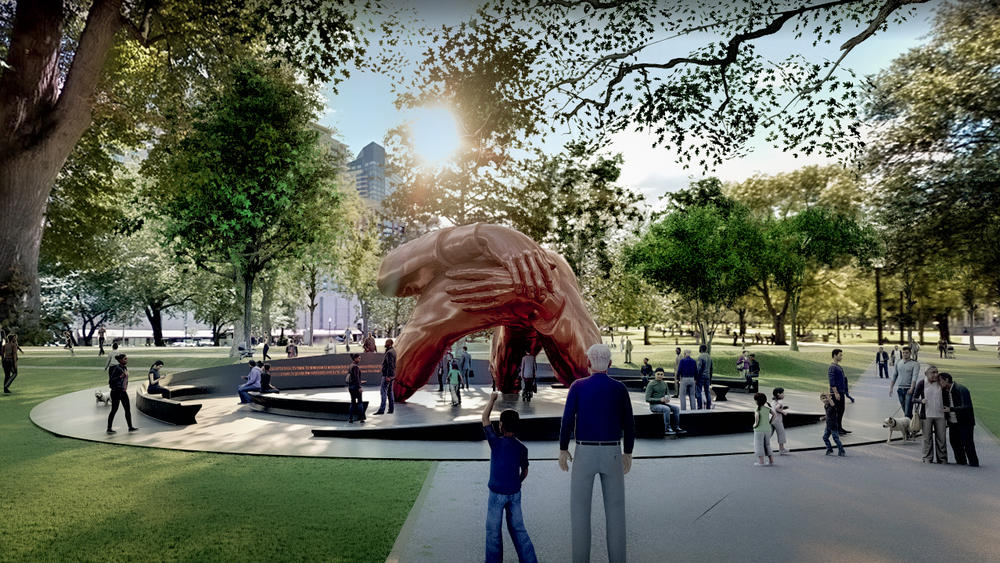Section Branding
Header Content
Boston breaks ground on a Martin Luther King memorial of its own
Primary Content
More than seven decades after the Rev. Martin Luther King Jr. lived, studied and preached in Boston, the city will soon have a memorial honoring him and his wife Coretta Scott King, who met each other there.
While countless monuments around the nation already memorialize King for his civil rights work, the Boston structure is meant as a tribute to both he and Coretta Scott King. It's intended to be a "symbol of love" as much as one of "equity, inclusion, belonging and justice," says Imari Paris Jeffries, executive director of King Boston, the nonprofit behind the project.
The 22-foot-tall bronze sculpture of the couple's arms intertwined, called "The Embrace," was inspired by a photo of the two hugging after King won the Nobel Peace Prize in 1964.
Designed by Hank Willis Thomas, a prominent Black artist, the structure will be surrounded by a circular "quilt" of grass and stone triangles that will also celebrate 65 other Bostonians involved in civil rights.
At a groundbreaking on Wednesday, on what would have been Coretta Scott King's 95th birthday, Paris Jeffries said the completed memorial will be unveiled on Martin Luther King Day, in 2023.
A groundbreaking celebrates the significance of a King monument in Boston
"It's a dream come true to make this real," he said. "It's about saying Boston is a city [where] all of us belong."
"This is such joy," Marie St. Fleur told the crowd gathered for a ceremonial groundbreaking. A Haitian immigrant and former prosecutor and state representative who was one of the monument's early organizers, St. Fleur was elated at the message the monument would send to people of color in her neighborhood of Boston.
"It's our park too," she said. "And we wanted to see ourselves in this park."
Boston Mayor Michelle Wu, the daughter of Taiwanese immigrants, struck a similar note, saying she has known what it's like to feel like she didn't really belong in certain public spaces. She said the monument would reinforce that Boston "is a city for everyone," and a city that will "wage war against injustice and racism in all its forms in every corner, but also doing so from a place of love."
"The Embrace" is the first significant monument of this scale to be added to the Boston Common, the nation's oldest public park, in 125 years.
It comes just a year and a half after a statue was removed from a nearby park amid complaints that it was demeaning to African Americans. "Emancipation Group" (a replica of "Freedman's Memorial" in Washington, D.C.'s Lincoln Park) was meant to pay tribute to President Abraham Lincoln and the Emancipation Proclamation he signed freeing the slaves. But many bristled at the depiction of a formally dressed Lincoln towering over a servile-looking, "mostly undressed Black man with broken shackles rising from his knees," as the city of Boston described it in a post soliciting public input on what to do with the statue. The statue also depicted a whipping post and chains.
"I remember when I first came to Boston for school, I walked by the statue and I thought this is humiliating," said Bill Singleton, who attended Harvard and later become a publisher, writer and filmmaker. "It was very insulting. Just horrible."
At the groundbreaking, Singleton, who is Black, was delighted by the "more dignified" portrayal of African Americans. "This is a definite change," he said, "and I welcome it."
Many see the new monument as long overdue
Indeed, many at the groundbreaking noted the monument was long overdue in the city King had called his second home.
"It's about time that Boston woke up and figured out how to make sure that we commemorated the life, the legacy and the dreams of Dr. King here in a very real way," said former state Rep. Jeffrey Sánchez. "We've taken way too long."
The Rev. Jeffrey Brown, co-chair of King Boston and associate pastor of the Twelfth Baptist Church in Boston, where Martin Luther King worshiped and preached, felt it too.
"It's been a long time coming," Brown said. "There's no one here who has rose-colored glasses about the city and the racial issues that we continue to have. But this moment also symbolizes the hope of getting beyond that, and creating the beloved community that we all seek."
Brown was also quick to note that building a monument is "the easy part." Much more challenging, he says, is "making sure that this city realizes [its] potential. But we're ready to engage in it."
Organizers hope the project inspires more work on racial and wealth equity
Indeed, King Boston is determined to build more than a sculpture in town. Organizers are planning an education and research center to develop and lead new efforts to end economic and racial injustice. Most of the $23 million they've raised so far is already committed to funding the monument, some community grants, and annual operating costs and salaries for their expanding staff, so a new, ambitious capital campaign for the center will kick off soon, once a site is confirmed.
Paul English, a serial entrepreneur who co-founded King Boston in 2017, said he's particularly interested in working on issues of "racial equity, wealth equity and trying to figure out how we can bring more $100,000 jobs into Dorchester and Roxbury and other neighborhoods in Boston.
"So hold us accountable," he implored the crowd gathered for the groundbreaking.
The Rev. Liz Walker, another King Boston co-chair, shared the sentiment, saying the monument, and the history it honors, "must inspire, provoke, elevate, anger and teach us."
"These are troubled times," she said, "but this day gives us great hope that we will learn from and embrace the lessons from our past and then act on them."
Demond Martin, a partner at a hedge fund in Boston and philanthropist, and one of King Boston's original seed funders, told the crowd he hopes the monument constantly reminds his two children "that this Boston is their Boston" and "that they can thrive here." But he too, insisted it also needs to serve as a reminder "of the work that we need to do."
"While we'll marvel at the art, we can't forget about the action," Martin said. "If we simply celebrate the symbol and don't do a better job of feeding the hungry, providing enhanced education and economic opportunities for black and brown people, then we fail. We fail at the very thing that Dr. King and Mrs. King strived for [...] and Dr. King died for."
Copyright 2022 NPR. To see more, visit https://www.npr.org.



